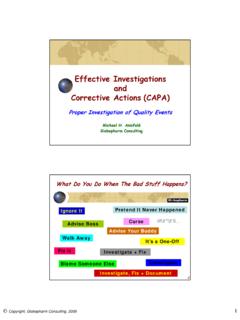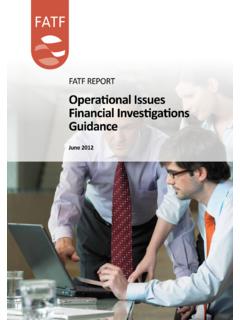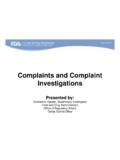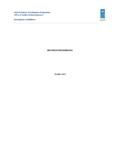Transcription of RECOMMENDATION OF THE OECD COUNCIL CONCERNING ...
1 1 2014 RECOMMENDATION OF THE OECD COUNCIL CONCERNING INTERNATIONAL CO-OPERATION ON COMPETITION INVESTIGATIONS AND PROCEEDINGS About the OECD Competition Committee The OECD Competition Committee is at the forefront of debate on competition policy and enforcement. Bringing together the leaders of competition authorities, it promotes the regular exchange of views, analysis and best practices on key competition policy issues. The Committee s work is supported by the Competition Division within the OECD Directorate for Financial and Enterprise Affairs.
2 About the OECD The OECD is a forum in which governments compare and exchange policy experiences, identify good practices in light of emerging challenges, and promote decisions and RECOMMENDATION to produce better policies for better lives. The OECD s mission is to promote policies that improve economic and social well-being of people around the world. effective and efficient co-operation among competition authorities is key to achieving competition enforcement and has been at the core of the OECD agenda for many years. After a first RECOMMENDATION in 1967, followed by a series of revisions, the OECD COUNCIL adopted on 16 September 2014 a RECOMMENDATION that calls for governments to foster their competition laws and practices so as to promote further international co-operation among competition authorities and to reduce the harm arising from anticompetitive practices and from mergers with anticompetitive effects.
3 The OECD is committed to supporting the implementation of the RECOMMENDATION . Governments who would like support with implementation can contact the OECD Competition Division at or 1 RECOMMENDATION of the OECD COUNCIL CONCERNING International Co-operation on Competition Investigations and Proceedings As approved by COUNCIL on 16 September 2014 C(2014)108 - C/M(2014)10 The COUNCIL , Having regard to Article 5 b) of the Convention on the Organisation for Economic Co-operation and Development of 14 December 1960; Having regard to the fact that international co-operation among OECD countries in competition investigations and proceedings has long existed and evolved over time, based on the implementation of the 1995 RECOMMENDATION of the COUNCIL CONCERNING Co-operation between Member Countries on Anticompetitive Practices affecting International Trade [C(95)130/FINAL] and its predecessors [C(67)53(Final), C(73)99(Final), C(79)154(Final) and C(86)44(Final)], which this RECOMMENDATION replaces.
4 Having regard to the RECOMMENDATION of the COUNCIL CONCERNING effective Action Against Hard Core Cartels [C(98)35/FINAL], to the RECOMMENDATION of the COUNCIL on Merger Review [C(2005)34], and to the Best Practices for the Formal Exchange of Information Between Competition Authorities in Hard Core Cartel Investigations [DAF/COMP(2005)25/FINAL] developed by the Competition Committee, as well as its analytical work on international co-operation, including the 2013 Report on the OECD/International Competition Network (ICN) Survey on International Enforcement Co-operation [DAF/COMP/WP3(2013)2/FINAL]; Recognising that anticompetitive practices and mergers with anticompetitive effects may constitute an obstacle to the achievement of economic growth, trade expansion and other economic goals of Adherents to this RECOMMENDATION ; Recognising that review of the same or a related practice or merger by multiple competition authorities may raise concerns of costs and the potential for inconsistent analyses and remedies.
5 Recognising that co-operation based on mutual trust and good faith between Adherents plays a significant role in ensuring effective and efficient enforcement against anticompetitive practices and mergers with anticompetitive effects; Recognising that the continued growth of the global economy increases the likelihood that anticompetitive practices and mergers with anticompetitive effects may adversely affect the interests of more than one Adherent, and also increases the number of transnational mergers that are subject to the merger laws of more than one Adherent.
6 Recognising that investigations and proceedings by one Adherent relating to anticompetitive practices and mergers with anticompetitive effects may affect, in certain cases, the important interests of other Adherents; Recognising that transparent and fair processes are essential to achieving effective and efficient co-operation in competition law enforcement; Recognising the widespread adoption, acceptance and enforcement of competition law as well as the concomitant desire of Adherents competition authorities to work together to ensure efficient and effective investigations and proceedings and to improve their own analyses; 2 Recognising that co-operation should not be construed to affect the legal positions of Adherents with regard to questions of sovereignty or extra-territorial application of competition laws.
7 Recognising that effective co-operation can provide benefits for the parties subject to competition investigations or proceedings, reducing regulatory costs and delays, and limiting the risk of inconsistent analysis and remedies; CONSIDERING therefore that Adherents should co-operate closely in order to effectively and efficiently investigate competition matters, including mergers with anticompetitive effects, so as to combat the harmful effects of both cross-border and domestic anticompetitive practices and mergers with anticompetitive effects, in conformity with principles of international law and comity.
8 Considering Adherents desire to enhance the existing level and quality of international co-operation and to consider new forms of co-operation that can make international competition enforcement more effective and less costly for competition authorities and for businesses alike; Considering that in light of the increasing globalisation of business activities and the increasing number of competition laws and competition authorities worldwide, Adherents are committed to working together to adopt national or international co-operation instruments to effectively address anticompetitive practices and mergers with anticompetitive effects, and to minimise legal and practical obstacles to effective co-operation.
9 Considering that when Adherents enter into bilateral or multilateral arrangements for co-operation in the enforcement of national competition laws, they should take into consideration the present RECOMMENDATION : On the proposal of the Competition Committee: I. AGREES that, for the purpose of the present RECOMMENDATION , the following definitions are used: Adherents refers to Members and non-Members adhering to this RECOMMENDATION ; Anticompetitive practice refers to business conduct that restricts competition, as defined in the competition law and practice of an Adherent; Competition authority means an Adherent s government entity, other than a court, charged with primary responsibility for the enforcement of the Adherent s competition law.
10 Confidential information refers to information the disclosure of which is either prohibited or subject to restrictions under the laws, regulations, or policies of an Adherent, , non-public business information the disclosure of which could prejudice the legitimate commercial interests of an enterprise; Co-operation includes a broad range of practices, from informal discussions to more formal co-operation activities based on legal instruments at the national or international level, employed by competition authorities of Adherents to ensure efficient and effective reviews of anticompetitive practices and mergers with anticompetitive effects affecting one or more Adherents.
















